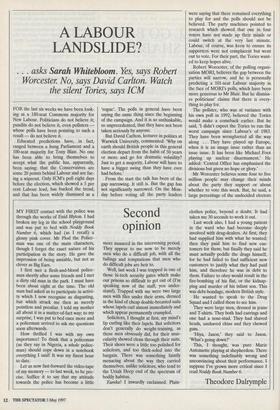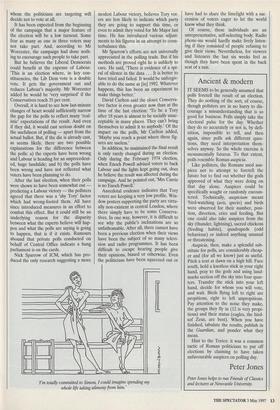A LABOUR LANDSLIDE?
. . . asks Sarah Whitebloom. Yes, says Robert
Worcester. No, says David Carlton. Watch the silent Tories, says ICM
FOR the last six weeks we have been look- ing at a 180-seat Commons majority for New Labour. Politicians do not believe it; pundits do not believe it, even pollsters whose polls have been pointing to such a result — do not believe it.
Educated predictions have, in fact, ranged between a hung Parliament and a 100-seat majority for Tony Blair. No one has been able to bring themselves to accept what the public has, apparently, been saying: that the Conservatives are some 20 points behind Labour and are fac- ing a wipeout. Only ICM's poll eight days before the election, which showed a 5 per cent Labour lead, has bucked the trend, and that has been widely dismissed as a `rogue'. The polls in general have been saying the same thing since the beginning of the campaign. And it is so unthinkable, so unprecedented, that they have not been taken seriously by anyone.
But David Carlton, lecturer in politics at Warwick University, commented: 'Why on earth should British people in this general election depart from the habit of 50 years or more and go for dramatic volatility? Just to get a majority, Labour will have to have a bigger swing than they have ever had before.'
From the start the talk has been of the gap narrowing. It still is. But the gap has not significantly narrowed. On the Mon- day before voting all the party leaders were saying that there remained everything to play for and the polls should not be believed. The party machines pointed to research which showed that one in four voters have not made up their minds or could switch at the very last minute. Labour, of course, was keen to ensure its supporters were not complacent but went out to vote. For their part, the Tories want- ed to keep hopes alive.
Robert Worcester, of the polling organi- sation MORI, believes the gap between the parties will narrow, and he is personally predicting a 101-seat Labour majority in the face of MORI's polls, which have been more generous to Mr Blair. But he dismiss- es politicians' claims that there is every- thing to play for.
The pollster, who was at variance with his own poll in 1992, believed the Tories would make a comeback earlier. But he said, 'I didn't expect the Tories to run the worst campaign since Labour's of 1983. They have been wrongfooted all the way along . . . They have played up Europe, when it is an image issue rather than an issue issue. It has been like Michael Foot playing up nuclear disarmament.' He added: 'Central Office has emphasised the divisions but given no hope or glory.'
Mr Worcester believes some four to five million people may change their minds about the party they support or about whether to vote this week. But, he said, a large percentage of the undecided electors whom the politicians are targeting will decide not to vote at all.
It has been expected from the beginning of the campaign that a major feature of the election will be a low turnout. Some fear as many as one in three voters may not take part. And, according to Mr Worcester, the campaign had done noth- ing to encourage such people to take part.
But he believes the Liberal Democrats could benefit at the expense of Labour. `This is an election where, in key con- stituencies, the Lib Dem vote is a double vote. It gets the government out and reduces Labour's majority. Mr Worcester added he would be 'very surprised' if the Conservatives reach 35 per cent.
Overall, it is hard to see how last-minute changes of heart would sufficiently narrow the gap for the polls to reflect many 'real- istic' expectations of the result. And even if they did, it would cast serious doubt on the usefulness of polling — apart from the actual ballot. But, if the die is already cast, as seems likely, there are two possible explanations for the difference between the polls: a) the experts have been wrong and Labour is heading for an unprecedent- ed, huge landslide; and b) the polls have been wrong and have not reflected what voters have been planning to do.
After the last election, when their polls were shown to have been somewhat out predicting a Labour victory — the pollsters agreed that there was a 'shy Tory' factor which had wrong-footed them. All have since introduced measures in an effort to combat this effect. But it could still be an underlying reason for the disparity between what the experts believe will hap- pen and what the polls are saying is going to happen, that is if it exists. Rumours abound that private polls conducted on behalf of Central Office indicate a hung parliament is on the cards.
Nick Sparrow of ICM, which has pro- duced the only research suggesting a more modest Labour victory, believes Tory vot- ers are less likely to indicate which party they are going to support this time, or even to admit they voted for Mr Major last time. He has introduced various adjust- ments to his figures in an attempt to coun- terbalance this.
Mr Sparrow's efforts are not universally appreciated in the polling trade. But if his methods are proved right he is unlikely to care. He said, 'There is evidence of a spi- ral of silence in the data . . . It is better to have tried and failed. It would be unforgiv- able to do the same as [in] 1992. Whatever happens, this has been an experiment to make things better.'
David Carlton said the closet Conserva- tive factor is even greater now than at the time of the last election: 'To be a Tory after 18 years is almost to be socially unac- ceptable in many places. They can't bring themselves to admit it to anybody.' Of the impact on the polls, Mr Carlton added, `Maybe you reach a point where these fig- ures are useless.'
In addition, he maintained the final result is only rarely changed during an election. Only during the February 1974 election, when Enoch Powell advised voters to back Labour and the lights kept going out, does he believe the result was affected during the campaign. And he pointed out, 'Mrs Currie is no Enoch Powell.'
Anecdotal evidence indicates that Tory voters are keeping a very low profile. Win- dow posters supporting the party are virtu- ally non-existent in central London, where there simply have to be some Conserva- tives. In one way, however, it is difficult to see why the public's inclinations are so unfathomable. After all, there cannot have been a previous election when their views have been the subject of so many televi- sion and radio programmes. It has been difficult to escape hearing people give their opinions, biased or otherwise. Even the politicians have been squeezed out or `I'm totally committed to Simon, I could imagine spending my whole life taking alimony from him.' have had to share the limelight with a suc- cession of voters eager to let the world know what they think.
Of course, these individuals are an unrepresentative, self-selecting body. Radio phone-ins would hardly make lively listen- ing if they consisted of people refusing to give their views. Nevertheless, for viewers and listeners the last six weeks feel as though they have been spent in the back seat of a taxi.



































































 Previous page
Previous page